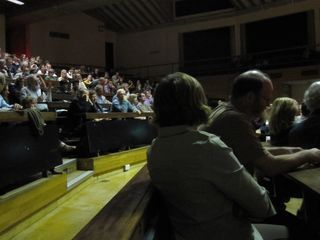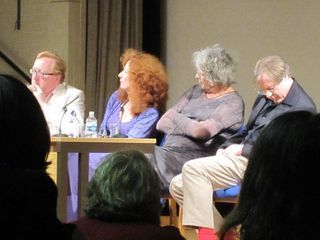Running a Classical conference: the inside story

We have just finished hosting our Classical conference in Cambridge -- three days, 400 delegates, so not big in American terms, but big enough for us. Just showing up at a conference is a quite different experience from going to a conference that you're actually helping to organise. When you're part of the home team, it's all a bit of a worry. In particular you're desperate that every paper, every event will be really good. (Lets face it, when you're just an ordinary attender, part of the pleasure is the tut-tutting over a drink about those papers that were truly horrendous ...it's not so when you're responsible for the whole show).
The truth is, I confess, that I was a bit of a minnow in the organisational team, and only really took reponsibility for the two evening "Open Fora" (one on Socrates and one on the Future of Pompeii); all the  same it is was sufficiently anxiety inducing and time-consuming to mean that I hardly got to any of the papers I wanted to hear or to speak to many of my mates.
same it is was sufficiently anxiety inducing and time-consuming to mean that I hardly got to any of the papers I wanted to hear or to speak to many of my mates.
As I've explained before, the idea of these was to open the conference to a wider public than just the signed-up conferees, and to put some interesting non-classicists into bat. Simple idea, so why so time-consuming? Well, on the one hand, all the usual potential disasters that needed averting (one of the participants had to withdraw for utterly cast-iron reasons with two days notice....bless her , Germaine Greer stood in almost no notice at all, but it was an unpleasant Saturday afternoon). But even without that, if you're not practised at it, just getting 4 people to converge on the same place at the same time, feed them, get them jollied up to talk engagingly, and then get them away again, easily becomes a full time job for a few days... believe me!
So what was the verdict?

We certainly got a good audience. We weren't actually turning people away at the door, but we did attract some "real people" (and on the Pompeii night, we also had some kids learning Latin with us on a Sutton Trust Summer School, not to mention a smattering of under 10s -- attracted, I guess, by the presence of Caroline Lawrence on the panel).
And did they hit the spot? Well, mostly yes. A few people would have liked a bit more philosophical rigour in Socrates, but that was not what we had intended these sessions to be for. And there were some great moments: Germaine laying into Socrates for the treatment of his wife (and also offering a delicious parody of a Melvyn Bragg style treatment of the great guru). And Roger Scruton got a good laugh at the end when Angie Hobbs asked the panellists if they had changed their minds about Socrates over the course of the discussion: "not about Socrates" he said, "but about Simon Heffer" (referring to a fellow panellist). But my favourite moment came with a question from Barbara Graziosi in the audience. Wasn't the problem about Socrates, she asked, not so much to do with an awkward commitment to freedom of expression, but the fact that he launched the Cynics on the Athenian population: that unpleasant brand of ancient thinkers, who would roll around the agora, naked and masturbating. Paul Cartledge tried to pour a bit of cold water on this, saying that we shouldn't imagine 100s of them, just a couple perhaps in the agora. To which Graziosi, not unreasonably replied, that one or two would have been quite enough (imagine a couple of naked, masturbating philosophers in your city centre).
As we streamed out, one of the American delegates said that such an event would have been unthinkable in the USA: you would never have got that group of panellists together in the same hall.
Last night, a few people would no doubt have liked a bit more hard core archaeology, but we had a great discussion of how we wanted 'our' Pompeii to be, from all kinds of points of view. Andrew Wallace-Hadrill kicked off with the story of how the collapse of one house at Pompeii had led to the resignation of an Italian government minister (to which David Cannadine observed that if we managed to let a whole row fall down it might spell the end of Berlusconi). By and large, to crudify their points considerably, Caroline (who had come complete with her trademark sponge on a stick, and a very elegant repro Roman mirror) and Simon Jenkins were broadly for reconstruction, or even theme park style replication -- whereas David was more into reflecting about why we couldn't just let these ruins become gently more ruined. Simon urged us to think about Stonehenge. What stops us simply reconstructing it? For heavens sake, it's supposed to be a clock -- and what's the good of a clock with no hands?
But again some of the best comments came from the audience, and indeed the younger members of it. Thank you Ewan and Romy (aged 12 and 9) for asking us what the current presentation of Pompeii offered kids (not much) and praising the House of Caecilius. And thanks to the young person at the back who responded to the general enthusiasm, ably stimulated by Caroline, for re-enactors on site (people dressed up as gladiators, Roman barmaids or whatever, engaging with and educating the visitors). He or she (the question was actually put by the student with the mike... and I couldn't quite see) rightly observed that most re-enactors were just rubbish, and you could see their props behind the screens. So why inflict these B-grade actors on us kids?
As Simon Jenkins glossed it: 'the Anne Boleyn in trainers problem".
That said, Caroline did give a great plug to the gladiator event at the Museum of London this weekend. (Notice to the fearful: no gladiators will be killed.)
Finally.. thanks to all my colleagues (academics, computer whizzes, brilliant support staff, graduate helpers etc) for all your hard work for the whole conference... much harder than mine.
Mary Beard's Blog
- Mary Beard's profile
- 4113 followers



